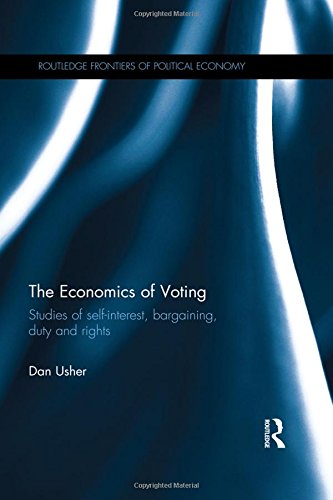

Most ebook files are in PDF format, so you can easily read them using various software such as Foxit Reader or directly on the Google Chrome browser.
Some ebook files are released by publishers in other formats such as .awz, .mobi, .epub, .fb2, etc. You may need to install specific software to read these formats on mobile/PC, such as Calibre.
Please read the tutorial at this link: https://ebookbell.com/faq
We offer FREE conversion to the popular formats you request; however, this may take some time. Therefore, right after payment, please email us, and we will try to provide the service as quickly as possible.
For some exceptional file formats or broken links (if any), please refrain from opening any disputes. Instead, email us first, and we will try to assist within a maximum of 6 hours.
EbookBell Team

5.0
40 reviewsThe economics of voting is about whether and to what extent self-interest may be relied upon in voting. The central proposition in economics is that the world’s work gets done satisfactorily when each person does what they think is best for themselves. The commonsense view of the matter is that this outcome alone would be chaos.
This book examines voting in four key terms: self-interest, bargaining, duty and rights. Self-interest creates a voting equilibrium on various issues, notably the redistribution of income. Bargaining has a larger role to play in voting than in commerce, as it becomes essential in the formation of platforms of political parties and for the passage of laws. A duty to vote arises from the fact that a person’s vote has only an infinitesimal chance of influencing the outcome of an election. Rights are a democracy’s first line of defense against exploitation that, unless constrained, the majority rule voting enables voters to expropriate the corresponding minority, undermining democracy completely.
Four key questions are asked in this book. When is there self-interest in majority rule voting comparable to the general interest in markets? To what extent does ‘government by majority rule voting’ depend upon bargaining as well as voting? Can willingness to vote be attributed to self-interest or is a sense of duty required? Does democracy require property rights? Through an examination of these terms, this book argues that they are indispensable requirements for the maintenance of government by majority rule voting. This book is essential for those who study political economy, economic theory and philosophy as well as political theory.